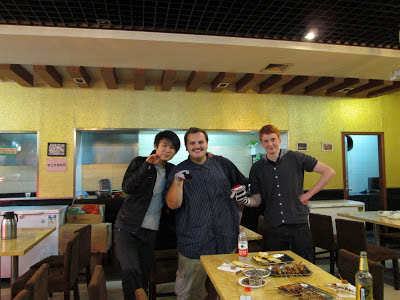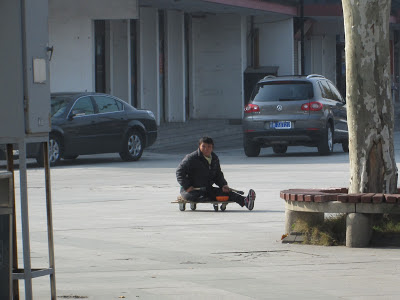I have decided to go back to Canada a good deal earlier than I
had originally anticipated in order to finish off my Master's thesis, and so
this shall be my very last blog post. It has been a very unique few months to
say the least here at Suzhou University (SuDa), but I feel my time would be better used back in Canada working
towards the completion of my degree. For this final blog post, I will list some
things that I will miss - and not miss- about my life here in Suzhou , China
What I Won't Miss:
A Lack of Manners
 |
| Not even picking up after his dog... |
It's the Chinese way to have very little in the way of a
filter between what you think and what you say, at least when it comes to
foreigners. Many Chinese will quite happily call you a stupid, fat, foreigner - or worse - right to your
face, and refer to you as such in front of their co-workers and friends because they
automatically assume that foreigners cannot speak any Chinese whatsoever. While it
can be very rewarding to cut into them using Mandarin, the temporary
satisfaction does not make up for the fact that it just keeps on happening, and
happening, and happening.
Something funny about the Chinese is how they often love
commenting on the exact same things about people. In my case, this is generally about the
fact that I am still wearing shorts in the winter. According to them, the winters in Suzhou are very, very cold, but I don't feel it at all.
 |
| Autumn |
 |
| Winter |
I've probably had the exact same conversation about my not
being cold at least seventy times over the past two months, to the point where I
had the entire conversation memorized right down to the Chinese facial expressions!
What is worse, however, is the noise, not caused so much by
the Chinese, but rather by the other foreign students on campus.
There are many Koreans studying here at SuDa. So many, in
fact, that most of the signs for foreigners around campus have Korean more
often than English:
 |
| If you couldn't read either Chinese characters or Korean (underlined in blue), you were screwed using the laundry! |
There is this song called "Gangnam Style," which
happens to be extremely popular right now, being the most watched video in
Youtube history. If you haven't seen it, here's the music video:
Many of these Korean students love to party nearly every
night of the week, and they always connect their iPods and laptops with their music libraries (which is mostly Gangnam Style and various remixes of it) to high-end speakers, which they then crank up to their maximum volume
and base settings to the point where literally everybody in the dorm building can hear it.
The din of their constant partying, of course, makes genuine studying a statistical impossibility. To make matters worse, despite the constants complaints from many of other dormitory residents, our ayi (阿姨,dorm carecakers) and our university administration have refused to do anything about to matter. And speaking of ayis...
"Free" Accommodation
According to the information that was given to me about my scholarship - these rules also apply to every other foreigner who has a scholarship in China - our rooms are supposed to be absolutely free, with us not having to pay for anything. However, my so-called free accommodation here at SuDa is far from
it, as we students are forcibly charged for our electricity and our internet usage. If we do
not pay our 'bill', our electricity gets turned off, period. The university even had the gall to make use coin-operated washing machines.
The university also
charges little user fees here and there for things like official forms - which
are also supposed to be free - and medical examinations - which are supposed to
be covered and not paid by us or our scholarship money. I'll be very happy to leave this corrupt little racket behind.
 |
| Coin-operated washing machines in a country where getting coins is absurdly difficult. Thanks, SuDa! |
 |
| At least the ayi had a nice smile when you paid her! |
SuDa has acceptable Chinese classes for foreigners if you
are interested in learning the very basics of the language, or wish to learn
"business Chinese." I already have good grasp of the basics - having
studied the language since I was 18 - and have no interest in learning
'business' vocabulary. My interests are more academic,
and the particulars of the Chinese language that I wish to learn - that is, the
more classical aspects of the language - are not available here at SuDa. It
also didn't help matters that the teachers I was stuck with were not interested
in discussing any more esoteric or academic topics in Chinese, and were rather
adamant about sticking to the dull-as-ditchwater textbooks.
Health Standards
Growing up in the sterile and extremely clean environment of
a first-world nation, I doubt I'll ever be able to accept what the Chinese
accept as 'clean.' Take this bathroom, for example:
The spitting is another matter. In traditional Chinese
society, it is seen as disgusting to swallow your own saliva, so everybody from
the youngest child to the oldest person spits. That by itself is off-putting by
itself, but the Chinese tend to go about spitting in a very ritualistic way by
loudly hocking their saliva up before actually spitting. It is especially
lovely when you hear this sound behind you, because you have to wonder if any
of that saliva is about to end up on your clothing or in your hair! Humorously, this is a habit the Chinese government has been trying to get rid of for years, so I'm obviously not alone in my disgust:
One thing I never mentioned in any of posts before is just
how nasty Chinese viruses and bacteria can be. I've had to struggle almost the entire time I've been here with constantly getting sick. If it wasn't some nasty cold, it was a fever; if it wasn't a
nasty cough, it was a it was a sore throat. Not being constantly sick is something
I'll be very grateful for.
 |
| You'd be surprised how fast I depleted my medical supplies |
With all of my griping out of the way, let's start mentioning the things I'll miss!
Things I'll miss:
Food
Despite one or two issues, I will honestly miss
most of the food here in Suzhou .
It is cheap, delicious, and nutritious, so what more could one ask for? At the
university - as well as just off campus - the places are all heavily subsidized
by the government, thus making the food exceptionally cheap, even for Chinese
standards. I generally spend no more than 50-70-RMB (about $10-15 Canadian) per
week on food, and it is very filling.
I especially love the vendors and hole-in-the-wall
restaurants all over the place that sell a wonderful variety of Chinese
goodies, such as egg-filled wraps (鸡蛋灌饼)...
...Chinese "burgers" ( 肉夹馍)...
... dumplings (包子)...
Unless you have actually eaten Chinese food in China ,
you have never truly eaten. The stuff everybody in Canada and the US eats at Chinese restaurants - and I
can speak from experience here - is a watered-down, flavorless bastardization of
the real deal, generally because the Chinese assume we are a bunch of sissies
who cannot eat their 'real' food. Thus, I'm going to genuinely miss having access
to all this great food.
 |
| At least China's most popular restaurant will still be available in Canada! |
Transportation
Transportation in China is both easily accessible and
cheap, even if you only have a very basic grasp of the language. Taxis are
available everywhere for reasonable prices, and can take you anywhere extremely
fast.
 |
| If they think you can speak Chinese, taxi drivers will also provide you with a rather humorous conversation partner! |
If you're feeling too stingy for a taxi, the bus and metro
systems in the cities are also top-notch, with stations for both found all over
Suzhou . I think it's hilarious I am more familiar with the bus system here in Suzhou than I am in my
own home town!
 |
| Xiangmen (相门) bus station, which I became very familiar with |
Finally, I cannot finish this section without waxing poetic
about the Chinese train system, which is by far the best and most efficient
train system I have ever seen - and I've traveled across continental Europe by train!
The tickets for the Chinese trains are reasonably priced, the
trains themselves are all well taken care of, and go extremely fast to get to you to your
destination, often going several hundred kilometers per hour. I was told that - back in the China of the 1980s - it used to take
at least eight hours for a train to get from Shanghai
to Nanjing .
Now, it can be done in less than two!
Canada
has a rail system as well, but it is both expensive and slow, and simply
nowhere near a great as China 's
railways.
 |
| Taken 2006 |
I never though in my wildest dreams that I would not only
end up teaching kindergartners but enjoy doing it as well. When I was a
teenager, I always loathed the idea of even having to babysit other kids,
wanting nothing more than to give them a good kick to shut them up.
I most certainly didn't feel that when teaching these kids,
however. I was able to play a lot of really fun games, direct a classroom, and
figure out just how hard teachers have to work to keep order in their
classrooms.
Of course there was the occasional annoying and rowdy child, but I honestly
enjoyed every single day that I taught these kids English, and I will really
miss them.
Friends
What can I say, other than I'll terribly miss the friends
I've made while here.
While it is a veritable United Nations of people here, I ended up befriending more Latinos - and
Latinas - than any other group of people. I can probably thank my roommate Miguel for this, who ended up being as great a roommate as I could have ever hoped for. Also, even though I can speak some Spanish,
it aggravated me to no end that I didn't study more Spanish after I graduated high school.
 |
| Miguel (Mexico) and Alan (Argentina) would have probably preferred my knowing more Spanish as well! |
I'll also miss the fellow kindergarten teachers that I
befriended, Nela, from Mexcio, who got me the teaching job in the first place...
...Christy, fromIreland , who was one
of my co-workers...
...and Michael, a really strange young man from Texas who loved endlessly talking about conspiracy theories...
I had a lot of fun conversing
with all of them about their experiences both teaching and living in China , and experiencing China from a radically different
way than just a mere student.
...Christy, from
 |
| The red-haired fellow, not our waiter who also wanted to be in the photo |
 |
| Artistic interpretation |
Conclusion
In conclusion, I'd like to thank all of you for reading my blog posts and
learning about my experiences these past few months. It has been a pleasure to
share my life in Suzhou
in this format with you all. With that, I bid you all adieu from the Venice of the East!




















































































































